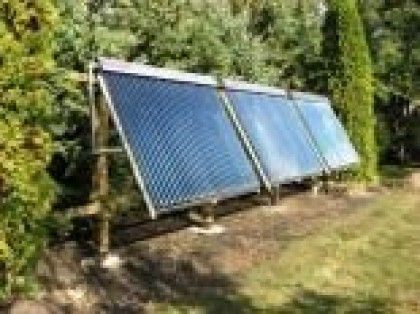
As per the estimation by the US Department of Energy, the heating cost is around 42% of utility bill at residential properties in an average. Installing residential solar water heaters can help you minimize on your utility expenses. These systems make the proper use of renewable energy to reduce the requirement for grid power and provide great volumes of hot water for your use at home.
In the contrast to traditionally designed water heaters, solar water heaters don’t need connections with your residential grid energy. Rather, these highly efficient systems make the proper use of dedicated solar collectors to draw power from the sun. In fact, solar energy is utilized to heat water for your residential use on a daily basis.
Generally, solar heating systems comprise of a storage tank and a solar collectors. There are two types of solar water heaters for both residential and commercial applications – active and passive. Direct active heating systems move the water through the solar collectors to gather heat and send to your showerheads and faucets.
But indirect active heating systems use a warming fluid for heat transfer from the collectors to your water supply. Integral passive solar water heaters use metal plates for heating water of small batches. After that, the pumps move the water into an insulated storage tank to use later. Passive thermosyphon systems utilize the heat from the sun to heat the stored water directly. Warm water emerges to the top that fills up a storage tank which is connected to your plumbing system.
However, solar water heating systems are capable of providing enough hot water for most of your residential daily requirements. A backup may be important for days when solar energy may be lacking. Most passive heating systems come with a tankless heater as a backup and the backup source can be electric or gas.
How Do You Choose the Right Solar Water Heater?
Different types of solar water heating systems work well in different environments.
. Direct heating systems work very well in climates that don’t often have temperatures below the freezing point. In colder climates, indirect active heating systems are more resistant to cold damage than others.
. Do you want your solar water heating system to handle more responsibilities? If yes, you should buy an indirect circulating system. Then, the heating fluid can be redirected to heat your pool in between supply heated water to your home.
. Families using more hot water during daytime can get benefited from integral passive heating systems. They will produce small batches of warm water so that you family should never worry about getting enough hot water for morning showers.
. Do you have enough roof space than the ground? A thermosyphon solar water heater fits your roof the best, leaving you with enough space in your living space.
Subsequently, residential solar water heaters depend on different factors, like:
. The amount of sunlight your home receives during day time
. The daily volume of hot water you need for your home
. Your budget
. Your installer’s preferable manufacturer
Bottom Line –
We at Latitude51 Solar understand that every home is different. Seek for expert guidance from Latitude51 Solar and let us help you choose the right residential solar water heaters. Feel free to contact us today and learn more about the equipment for your project. For more information, please visit our website at https://www.latitude51solar.ca/residential-solar-water.

